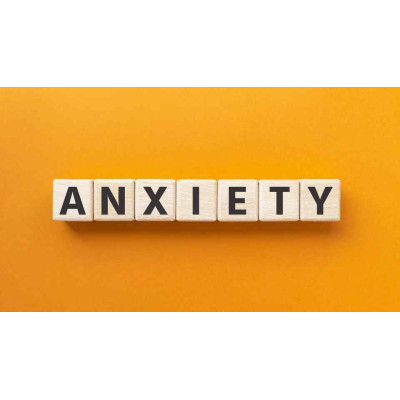
Get Anxiety Medication Online
In today's fast-paced world, it's common for individuals to experience feelings of anxiety from time to time. Anxiety is a natural response to stress or danger, but when it becomes excessive or disproportionate to the situation, it can significantly impact one's quality of life. Situational anxiety, in particular, is a type of anxiety that arises in response to specific events or situations. In this blog, we'll delve into the complexities of anxiety, explore what situational anxiety entails, and discuss strategies for managing it effectively.
What is Anxiety?
Anxiety is a normal and often necessary emotion that helps us respond to perceived threats or challenges. It triggers the body's fight-or-flight response, preparing us to either confront the danger or flee from it. However, when anxiety becomes chronic or overwhelming, it can interfere with daily functioning and overall well-being.
People experience anxiety in various forms, ranging from mild unease to debilitating panic attacks. Generalised anxiety disorder (GAD) is characterised by persistent and excessive worry about a wide range of everyday concerns. On the other hand, situational anxiety is more specific and typically arises in response to particular triggers or situations.
Understanding Situational Anxiety
Situational anxiety, also known as state anxiety, refers to the apprehension or fear experienced in specific circumstances. These situations can vary widely and may include public speaking, taking exams, attending social events, or flying on aeroplanes. While it's natural to feel nervous or stressed in these scenarios, situational anxiety occurs when these feelings become overwhelming and interfere with one's ability to function effectively.
Unlike generalised anxiety disorder, which persists over time, situational anxiety is often temporary and tied to specific triggers. However, the intensity of the anxiety experienced during these situations can be debilitating for some individuals, leading to avoidance behaviours and impacting their daily lives.
Causes and Triggers of Situational Anxiety
The causes of situational anxiety can be multifaceted and may involve a combination of genetic, environmental, and psychological factors. Some individuals may have a predisposition to anxiety due to their genetic makeup or family history, while others may develop situational anxiety as a result of past traumatic experiences or learned behaviours.
Triggers for situational anxiety can vary widely depending on the individual and their unique circumstances. Common triggers include:
Performance-related situations: Public speaking, job interviews, presentations, or performing in front of others can evoke feelings of anxiety in many people.
Social situations: Parties, networking events, or meeting new people can be anxiety-provoking for individuals who struggle with social anxiety.
Health-related concerns: Medical procedures, doctor's appointments, or waiting for test results can trigger anxiety in those with health-related anxiety.
Academic or work-related pressure: Exams, deadlines, or evaluations can lead to heightened stress and anxiety for students and professionals alike.
Travel or transportation: Flying on aeroplanes, driving in heavy traffic, or navigating unfamiliar environments can provoke anxiety in some individuals.
Signs and Symptoms
The signs and symptoms of situational anxiety can manifest both physically and psychologically. Common symptoms include:
Physical symptoms: Rapid heartbeat, sweating, trembling, shortness of breath, dizziness, nausea, or gastrointestinal distress.
Psychological symptoms: Excessive worry, fear of losing control, feeling on edge or restless, difficulty concentrating, irritability, or avoidance of triggering situations.
These symptoms can vary in intensity and may fluctuate depending on the individual's level of stress and coping mechanisms.
Managing Situational Anxiety
While situational anxiety can be challenging to navigate, there are various strategies and techniques that individuals can employ to manage their symptoms effectively. Here are some tips for coping with situational anxiety:
Deep breathing and relaxation techniques: Practice deep breathing exercises, progressive muscle relaxation, or mindfulness meditation to help calm the body and mind.
Cognitive-behavioural strategies: Challenge negative thoughts and beliefs associated with anxiety-inducing situations. Replace irrational fears with more realistic and positive affirmations.
Gradual exposure: Gradually expose yourself to the triggering situation in a controlled and supportive environment. Gradual exposure can help desensitise you to the anxiety-provoking stimulus over time.
Seek support: Reach out to friends, family members, or mental health professionals for support and guidance. Talking to someone you trust can provide reassurance and perspective.
Healthy lifestyle habits: Maintain a balanced diet, engage in regular exercise, prioritise adequate sleep, and limit caffeine and alcohol consumption. A healthy lifestyle can help reduce overall stress and improve resilience to anxiety.
Seeking Professional Help
In some cases, situational anxiety may be severe or persistent enough to warrant professional intervention. Mental health professionals and pharmacists can provide various therapeutic interventions to address anxiety symptoms effectively.
Cognitive-behavioral therapy (CBT): CBT is a widely used therapeutic approach that focuses on identifying and challenging maladaptive thought patterns and behaviours associated with anxiety.
Exposure therapy: This form of therapy involves gradually exposing individuals to feared situations or stimuli in a controlled environment, helping them confront and overcome their fears.
Medication: Medication can be prescribed to alleviate symptoms of anxiety. Our team at MedsRus Online Pharmacy can prescribe anxiety medication to those who need it. Start your consultation here.
Get Anxiety Medication Online
Situational anxiety is a common experience that many individuals encounter at various points in their lives. While it can be distressing and challenging to navigate, it's essential to remember that effective coping strategies and support systems are available. By understanding the triggers, signs, and symptoms of situational anxiety, individuals can develop personalised approaches to manage their anxiety effectively and improve their overall well-being.
If you or someone you know is struggling with situational anxiety, don't hesitate to reach out for support. Our team at MedsRus Online Pharmacy can help you get the treatment that you need. Remember, you are not alone, and there is hope for a brighter, anxiety-free future.


